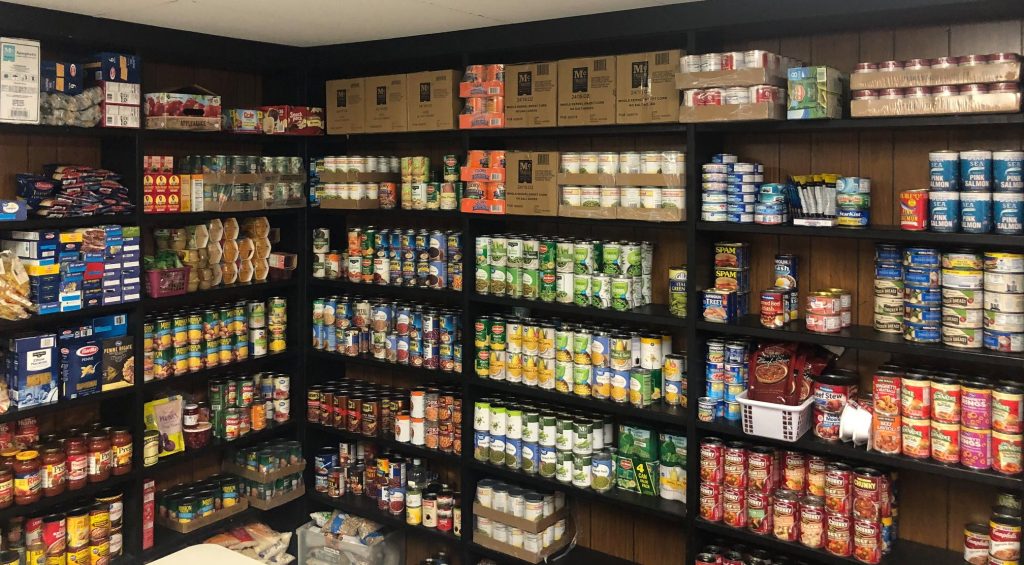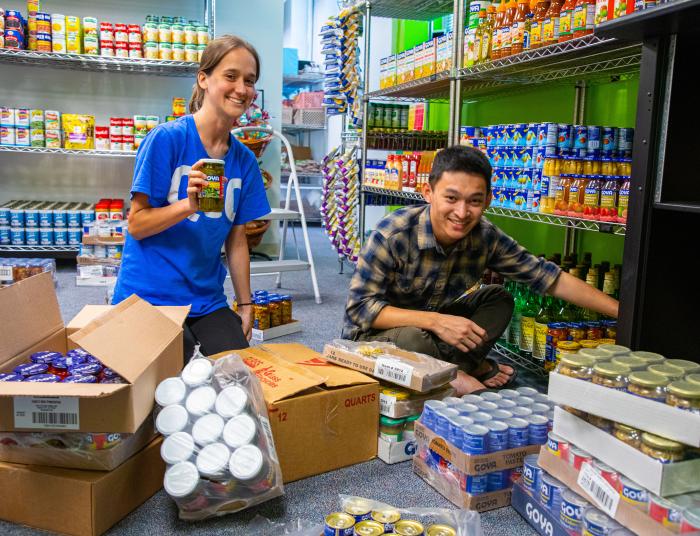Why Sustaining Your Regional Food Pantry Is Crucial for Aiding Those in Requirement
The value of supporting neighborhood food kitchens can not be overemphasized, especially in the context of food instability, which impacts a disconcerting variety of individuals and households within our areas. These crucial resources not just supply prompt remedy for appetite however likewise contribute to more comprehensive societal benefits, consisting of enhanced health and academic end results. As we check out the complex role of food kitchens, it comes to be evident that their effect extends much past simply distributing food (Food Pantry Lockhart). Comprehending this deeper connection might prompt a reconsideration of how we engage with and sustain these vital institutions.
Understanding Food Insecurity
Food insecurity affects roughly 10.5% of homes in the USA, highlighting a significant public health issue that transcends simple hunger. It refers to the absence of consistent access to adequate food for an energetic, healthy life. This condition can cause a variety of negative end results, including inadequate health and wellness, raised health care expenses, and lessened scholastic efficiency amongst children.
The causes of food insecurity are multifaceted, typically originating from financial variables such as underemployment, destitution, and joblessness. Geographical location can likewise play a crucial duty, with food deserts-- locations with restricted access to nourishing and inexpensive food-- intensifying the issue - Food Pantry Lockhart. Furthermore, systemic elements, consisting of racial and social injustices, add to the disproportionate impact of food insecurity on marginalized communities
Resolving food insecurity is not merely about raising food supply; it calls for a thorough strategy that incorporates economic stability, education and learning, and neighborhood assistance. Food instability not only impacts individual health but likewise has more comprehensive implications for social health and efficiency. Understanding its complexity is important for creating effective interventions and promoting long-term services that make sure all people have trusted access to nutritious food.
The Role of Food Pantries
Neighborhood food pantries offer as essential lifelines for people and families facing food insecurity. They give necessary food things to those that might battle to manage sufficient nourishment due to financial difficulty, unemployment, or unanticipated circumstances. By distributing food at no charge, these organizations assist reduce cravings and stop the unfavorable wellness impacts linked with poor diet plans.
Food pantries typically companion with regional ranches, supermarket, and area organizations to source a selection of nutritious food things, including fresh produce, dairy, and healthy proteins. This partnership makes certain that pantry clients get not just nourishment yet also much healthier alternatives that add to overall well-being.
In addition, food cupboards function as community centers, fostering connections among locals and offering a feeling of dignity to those in need. Numerous cupboards supply additional sources, such as nourishment education and referrals to social services, assisting clients navigate their difficulties better.
Essentially, food kitchens play a multifaceted duty in combating food instability. They not only address immediate hunger yet likewise equip individuals and households to improve their circumstances, thus promoting community durability and communication.

Advantages of Supporting Food Pantries

Supporting food cupboards not only nourishes those in requirement yet why not check here additionally enhances the material of the area. By providing essential food resources, food pantries relieve hunger and lower food instability, which is important for the health and health of households and people. Access to healthy food adds to improved physical health and wellness, better instructional outcomes for kids, and boosted mental health, thus cultivating a much more productive and involved community.
Moreover, supporting food cupboards promotes social cohesion. These companies function as centers for neighborhood involvement, uniting volunteers, donors, and recipients in a shared objective to battle cravings. This collaboration can damage down barriers, foster understanding, and build partnerships among varied area participants.
Furthermore, contributions to food cupboards, whether in the form of food, funds, or time, promote the local economy. Numerous food pantries prioritize sourcing from local manufacturers, therefore supporting neighborhood agriculture and companies. This develops a cycle of assistance that profits not just those in requirement however the area all at once.
Just How to Obtain Included
Engagement with food kitchens can take many types, permitting people and teams to make a significant influence in their neighborhoods. Among one of the most straight ways to get included is by donating food products. Non-perishable things such as canned goods, pasta, and rice are constantly sought after. Monetary donations are also vital, as they allow food kitchens to buy fresh fruit and vegetables and important materials.
Volunteering your time is another impactful method to support neighborhood food cupboards (Food Pantry Lockhart). In addition, consider organizing food drives within your school, community, or workplace team to elevate understanding and gather sources.
Partnerships with neighborhood companies can better improve support for food pantries. Organizations can hold contribution occasions or contribute a portion of their sales to the kitchen. Spreading the word with individual networks and social media helps to boost exposure and motivate others to add. By taking these individuals, actions and groups can significantly reinforce the initiatives of local food kitchens and help those in demand.
Area Impact and Connection
Recognizing the extensive impact of food pantries on neighborhood health is crucial for fostering a spirit of link and collaboration. Food kitchens serve not just as vital sources here for those dealing with food instability but also as hubs for neighborhood involvement. They combine diverse teams-- clients, contributors, and volunteers-- producing a Click This Link setting where people can sustain and attach each other.
The effect of food kitchens extends past simple stipulation of food; they function as a driver for social cohesion. By taking part in cupboard initiatives, area members can establish partnerships that go beyond socioeconomic obstacles. This network of assistance helps to take apart the stigma commonly connected with food support, cultivating an environment of acceptance and understanding.
As people unite in their efforts to sustain regional food cupboards, they cultivate a feeling of common objective and obligation, reinforcing the idea that everyone has a function to play in making sure that no one goes hungry. Inevitably, supporting food pantries strengthens the textile of the area as a whole.
Final Thought
Supporting local food cupboards is necessary in combating food insecurity and boosting the well-being of vulnerable populaces. Engagement with food kitchens fosters neighborhood connections, advertising social cohesion and equity.
